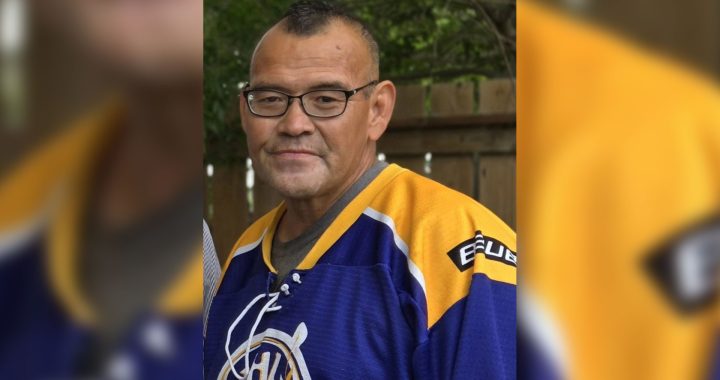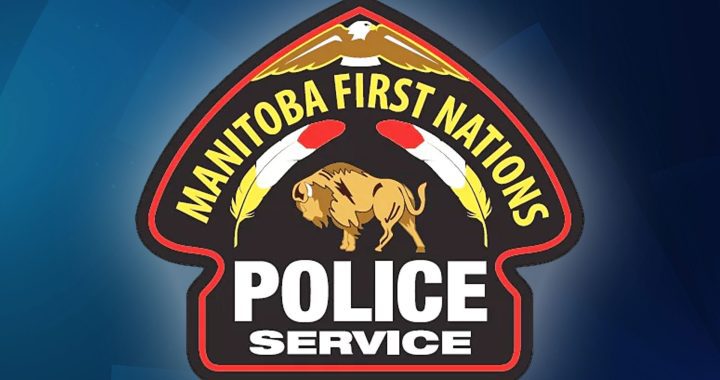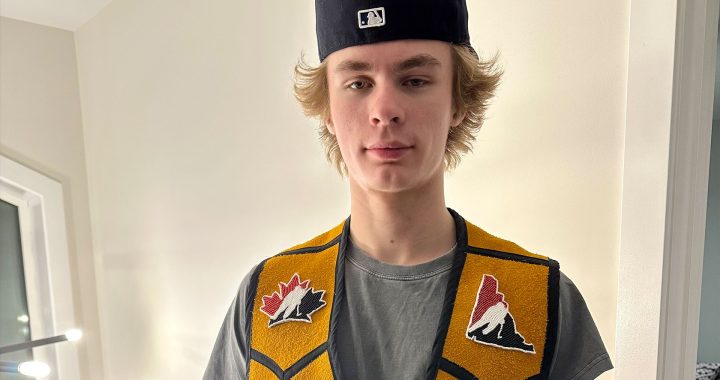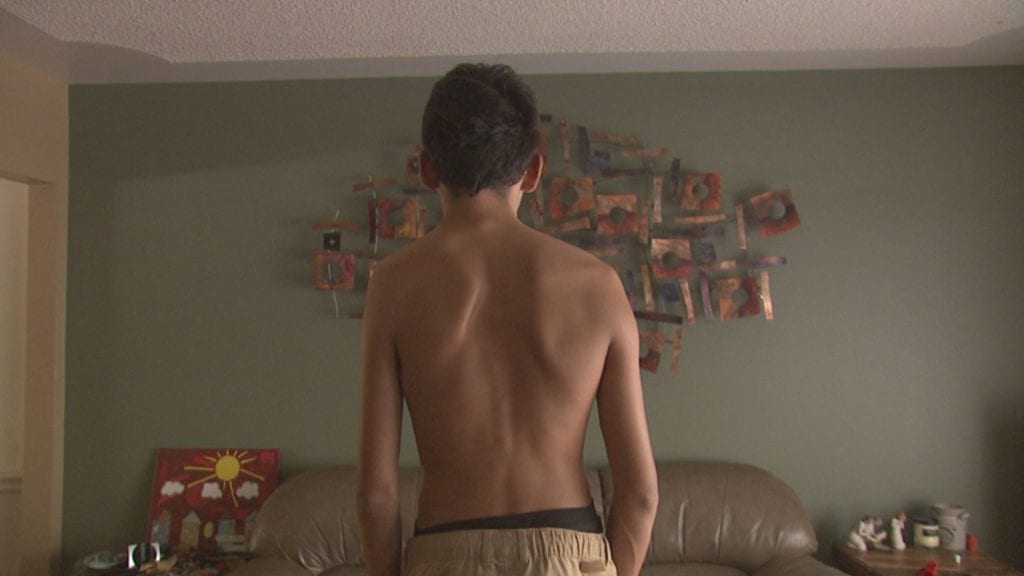
BIll Deafy removed his shirt to show how his back is deformed from a rare condition. Sprengel's deformity usually prevents one shoulder blade from growing properly.
Medical records show that a 14-year-old First Nations boy in northwestern Ontario missed years of medical checkups, including a referral to a specialist, while in the care of an Indigenous child welfare agency.
That may now leave him deformed for the rest of his life.
The boy has Sprengel’s deformity, a rare congenital disorder where one shoulder blade is larger than the other.
In this child’s case his left shoulder blade is smaller than the right and it’s causing him pain every time he tries to use his left arm, which has a limited range of motion.
“Every morning when I wake up and reach my left arm up in the air to get in the shirt, I get this really sharp pain and it lasts for about a minute. It’s like stubbing your toe, times two. It just doesn’t feel good,” said the boy, who APTN News isn’t identifying, from his home in northwestern Ontario.
“I just get sudden strikes of pain in my back … [It] hurts more playing sports.”
Sprengel’s can be corrected with surgery when the child is around three or four years of age, but this youth never got surgery, despite records showing officials suspected the deformity just before he turned four in late October 2009.
The medical records — provided by the youth — show his general practitioner at the time, Dr. Sara Van Der Loo, said he then still had a “good range of motion.”
The records also show that Dr. Peter Clark, an orthopedic specialist in Thunder Bay, agreed at the time.
“If he does have Sprengel’s deformity, then it certainly is quite mild and I do not think it is going to cause any long-term problems or functional deficits,” said Clark in his assessment.
The specialist recommended stretching and exercise.
By the following June, Clark said he didn’t need to see the youth again following x-rays of his shoulders saying the youth still had a good range of motion.
Then there’s nothing in his medical records for two years — from August 2011 to September 2013 — from either Clark or Van Der Loo.
By November 2013, at the age of eight, his shoulder was getting worse. The range of motion was decreasing and he was having pain. His former foster mom brought him in again to have his shoulder checked by Van Der Loo.
Records show that Van Der Loo referred him again to Clark on Dec. 28, 2013.
But he never did see Clark, or any specialist, as Sprengel’s took hold of the young boy, according to the boy’s medical records.
Weechi-it-te-win Family Services, based in Fort Frances, was his legal guardian at the time, according to the records, and remains so today. That means it’s the agency’s responsibility to ensure his medical needs are met. According to Ontario’s Child, Youth and Family Services Act, that includes attending his medical appointments.
Weechi provides child welfare services to 10 local First Nations.
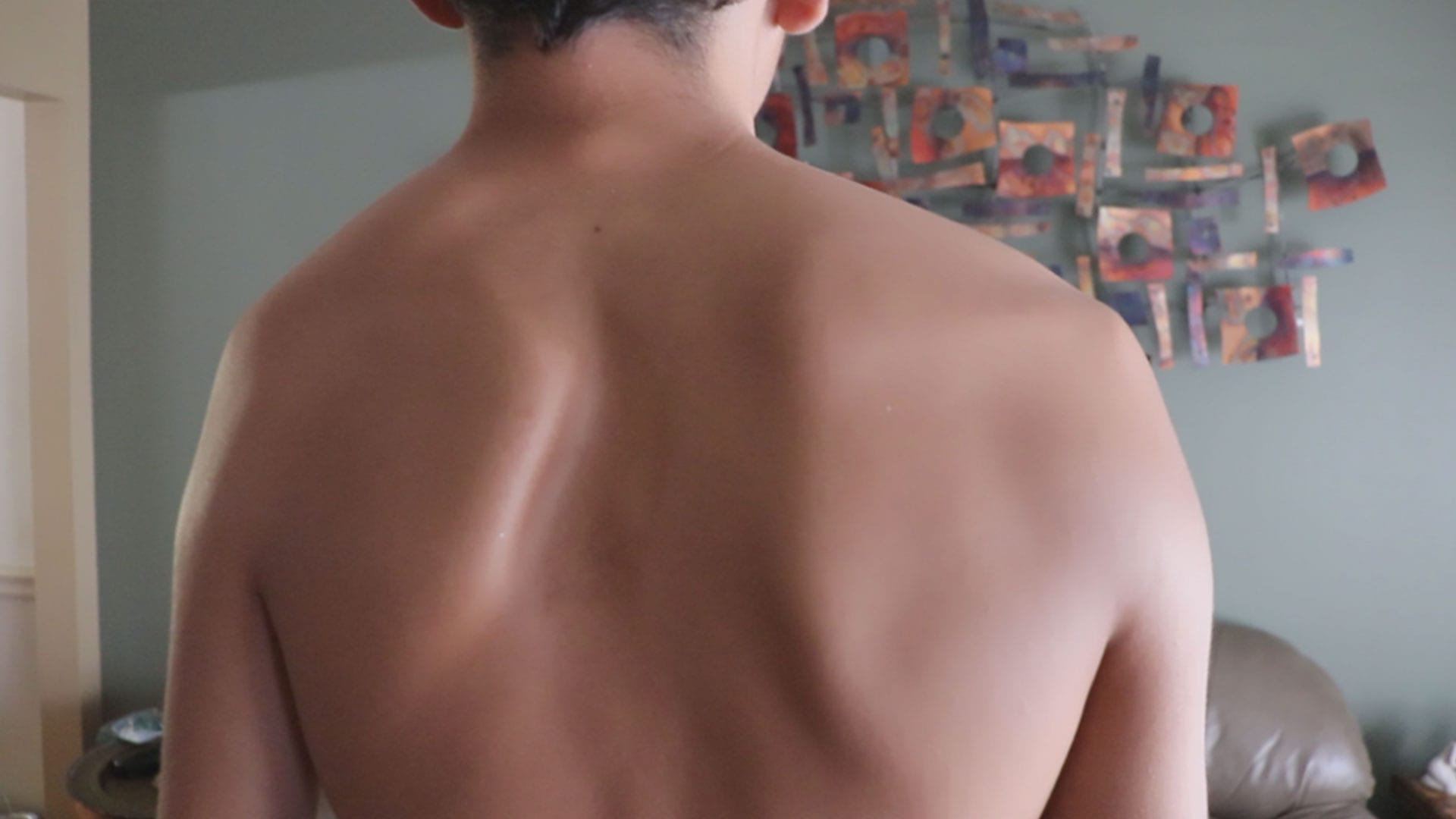
Nine months later the youth had an annual medical examination that didn’t raise any flags but was completed by a different doctor than Van Der Loo.
The youth’s records show no entries again until March 28, 2017.
That’s when Ann Strand, a child welfare worker from Weechi, called Van Der Loo asking when the youth’s last annual medical exam was completed.
Van Der Loo said Sept. 5, 2014.
There’s no mention of his shoulder again until June 2019 when the boy had a new caregiver who was asking a lot of questions about the shoulder.
The youth was referred back to Clark in Thunder Bay in Sept. 2019.
A special surgery known as the “Green-Woodward” procedure may be able to fix the shoulder blade, said Clark, but he added “textbooks” say it’s best done before the age of three or four years.
Clark said the severity of the deformity was a Grade 3. The highest is Grade 4.
As previously mentioned, the youth was supposed to see Clark again when he was eight but, according to the medical records, it never happened.
Clark referred the youth for additional tests including an ultrasound of his abdomen, as there can be “associated congenital anomalies” related to Sprengel’s, he said.
He also issued a referral for an MRI.
He needed this all done before he could refer the youth to Sick Kids Hospital in Toronto for surgery.
The MRI was completed last December but the youth’s caregiver said she had to continually call and text Weechi to get the date of the MRI.
Records show it took nearly a month for Weechi to tell the caregiver when the appointment was scheduled.
The ultrasound still hasn’t happened. The MRI resulted in a referral for a CT scan, which also hasn’t happened.
Records show that the referral was made for the ultrasound and CT scan but Weechi hasn’t told the caregiver when the appointments are.
Clark’s ultrasound referral asked for it to be done within 10 days – last December.
“Trying to work with Weechi-it-te-win to get the medical care and medical screening that he needs has been one of the most frustrating things I have ever dealt with,” said the youth’s caregiver, who has been providing foster care since the spring of 2018 in what’s known as a customary care agreement.
“Frustrating and heartbreaking — for him,” the caregiver added.
She said there seems to be a lack of urgency at Weechi and it doesn’t help that the youth does not have an assigned worker and didn’t meet with anyone for more than three months. The last person he met at Weechi said she was a secretary who was doing his plan of care, said the caregiver.
The youth wants the surgery no matter how intrusive it is or how long it takes to recover, which could be six months. Even then, it may not work because of his age.
“I kind of want it really bad so my left shoulder feels better and so I can do as much as my right [shoulder],” he said.
“The worst that could happen is it just gets worse. I don’t use my left arm for much things so I don’t think it would make much different. It works, but just not as well my right arm. It’s not as flexible.”
But he’s mad it got to this point.
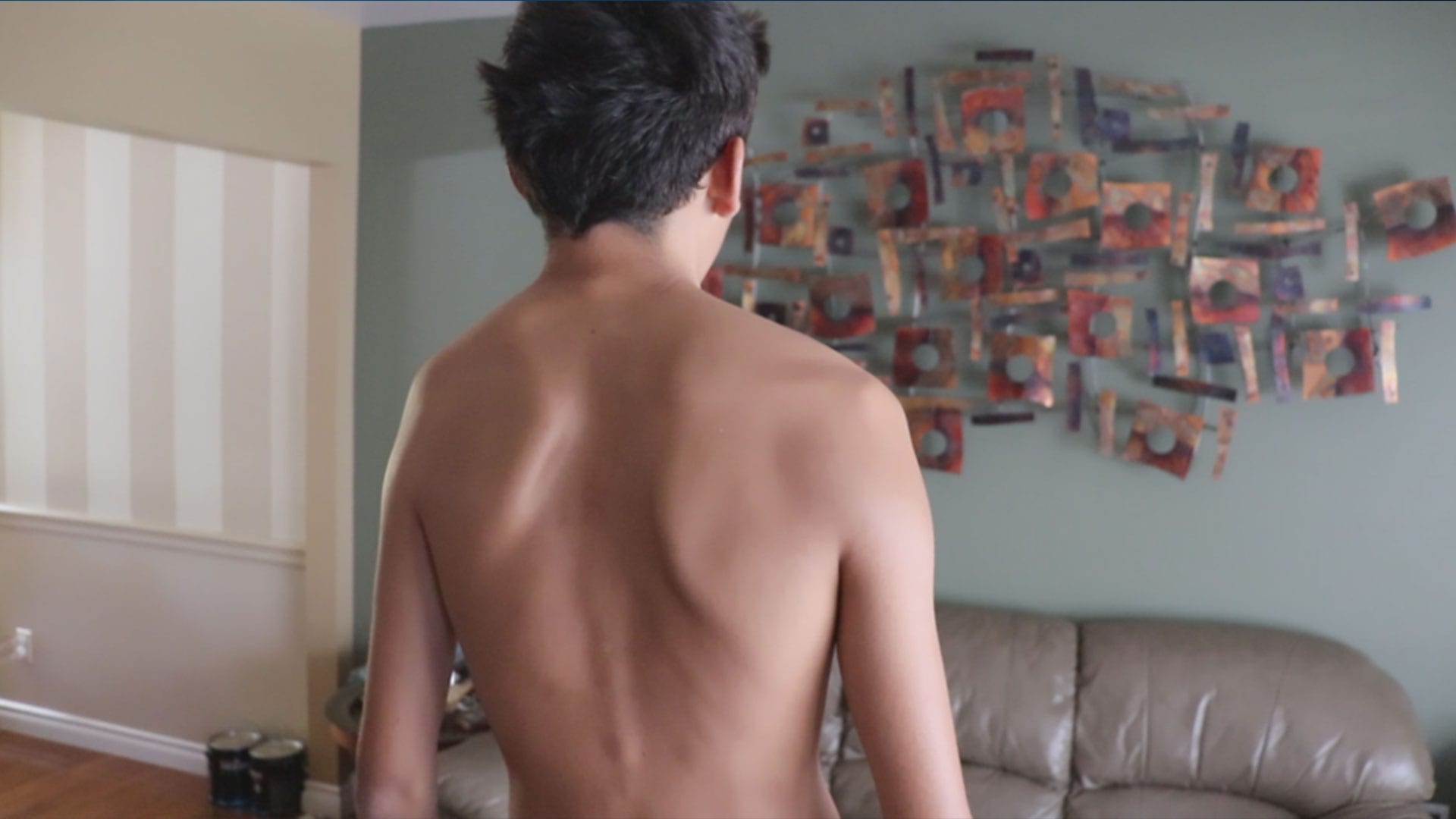
“Really upset. It makes me mad. I don’t like it. I know if I was in [Weechi’s] situation to do something I would do it and not wait many years to do so,” he said.
The caregiver has hired a lawyer to help get answers.
But so far, Weechi also hasn’t responded to Julie Tremain of law firm Waddel Phillips in Toronto either.
“[The youth] is now experiencing increasing pain and discomfort in his shoulder and his back, and he would like to have this resolved as soon as possible. It was [the youth’s] understanding that surgery could be performed at Sick Kids Hospital in Toronto, but Dr. Clark needs the results of the ultrasound before he can make that referral,” Tremain wrote Weechi June 12.
Because the caregiver isn’t the legal guardian the appointments have to go through Weechi.
There’s also another issue.
The youth is from one of the nations under Weechi but doesn’t have Indian status.
Which raises the question of how he ended up under Weechi’s care in the first place?
Tremain also asked for a copy of the youth’s customary care agreement, which hasn’t been provided.
Laurie Rose, the executive director of Weechi, and the so-called legal guardian of the youth, responded to APTN after several emails and telephone calls with the following statement:
“Kenneth, thank you for your communications. As you are aware, we are statutorily and culturally prohibited from communicating with third parties including the media of which you are a part respecting those individuals which whom this agency interacts in this type of situation. Indeed, we believe all such matters, including disputes, are properly dealt with between the parties directly. This is especially so where, for instance, such issues may be the subject of legal consideration.
The Agency, and the Communities that it represents in devolution to Indigenous autonomy respecting their children and families, remain committed to the wellness of all, including their privacy rights and the right of redress through appropriate channels of consideration in accordance with our traditions. We are proud of what we do, but regrettably and compellingly, do not air matters of such enormity in the public forum to which you prescribe.”

- This story was edited by Paul Barnsley.







